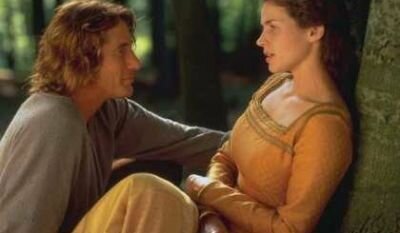|
|
| Tookey's Review |
|
| Pro Reviews |
|
| Mixed Reviews |
|
| Anti Reviews |
|
| Cast |
|
| |
 |
| |
| Released: |
1995 |
| |
|
| Genre: |
ACTION
DRAMA
SWASHBUCKLER
ADVENTURE
ROMANCE
COSTUME
|
| |
|
| Origin: |
US |
| |
|
| Length: |
134 |
|
| |
|
| |
|
|
| |
|
|
Sir Lancelot (Richard Gere, pictured left) comes between Queen Guinevere (Julia Ormond, pictured right) and King Arthur (Sean Connery).
|
Reviewed by Chris Tookey
|
You may think you already know the romantic legend of Queen Guinevere, torn between respect for her husband, King Arthur, and love for his favourite knight, Sir Lancelot; but First Knight plays a few unusual variations on the Arthurian theme. Did you know, for instance, that Guinevere was a keen amateur soccer player? or that Camelot invented the tickertape parade? or that Sir Lancelot du Lac, far from being a young French aristocrat, was a middle-aged, American-accented man of the people?
Malory and Tennyson must be spinning in their respective graves. In a comprehensive dumbing down of Arthurian Legend, director Jerry Zucker - whose early films, such as Airplane! , used to poke fun at such foolishness - has banished Merlin, the Lady of the Lake, the Holy Grail and Sir Galahad, not to mention the entire mediaeval code of chivalry.
In their place come Sir Malagrant (Ben Cross), a sneering, English baddie drawn from Hollywood stock; Uzi-style crossbows; and a thoroughly twentieth century Sir Lancelot (Richard Gere) who talks like an American game show host ("Give him a hand - he fought well!" he says of one opponent).
It's so anachronistic, I half expected there to be a Jewish character called Morty D'Arthur - but no such luck. First Knight may plays as fast and loose with English legend as Robin Hood Prince of Thieves, but it lacks the Costner film's sense of fun.
As Guinevere, Julia Ormond has to do little more than look confused whenever Richard Gere crinkles his eyes at her. Still, she is lively and photogenic , and - these being the 1990s - gets to kill almost as many bad guys as Sir Lancelot.
Sean Connery has the necessary gravitas as King Arthur, but looks old enough to be Guinevere's great-grandfather. Still, he also provides the only reason for suspense, or First Knight nerves. Whenever he walks beneath burning torches, he runs the risk of his hairpiece going up in flames.
Not even Connery can rescue Arthur's Christian ethic from being watered down by William Nicholson's disappointingly uninspired script into Blairish-Majorite woffle: "In serving each other," he pontificates, "we become free".
At the other, more Redwooden extreme ('Men don't want brotherhood, they want leadership'), Ben Cross can do little with a villainous role that requires he spend all his time in a sulk. What was wrong with Malory's Sir Mordred, who at least had an interesting grievance?
The Gere-Ormond love scenes are not helped by Sir Lancelot appearing to be much more in love with himself than the leading lady. The film's quest for Hollywood's equivalent of the Holy Grail - a PG certificate - removes any element of sensuality. Poor old Arthur seems guilty of grumpy over-reaction when he puts Lancelot and Guinevere on trial for treachery, after what looks little more than a brother-and-sisterly embrace.
A massive budget and much professionalism ensure that the big set-pieces - Prince Malagrant incinerating a village, a night-time attack by Arthur's army, the final storming of Camelot - are impressive enough. If you go hoping for spectacle and swordplay, you will not be disappointed.
But there is no freshness or depth here, and too little life. Camelot looks artificial, with Disneyland towers and colour-co-ordinated townspeople. The cardboard characters engender no real suspense about whether good will triumph over evil.
The film looks expensive but feels cheap. It seems to have been made with no higher aim than to turn a profit (it didn't). John Boorman's Excalibur and Lerner and Loewe's Camelot had many faults, including pomposity, but they did at least seem to be using the past to comment on the present, and certainly conveyed a sense of wonder.
First Knight wastes the resources of an epic on a story and characters which would barely sustain a B-western. It's not a Myth; it’s a Mythtake.
|
|
|
